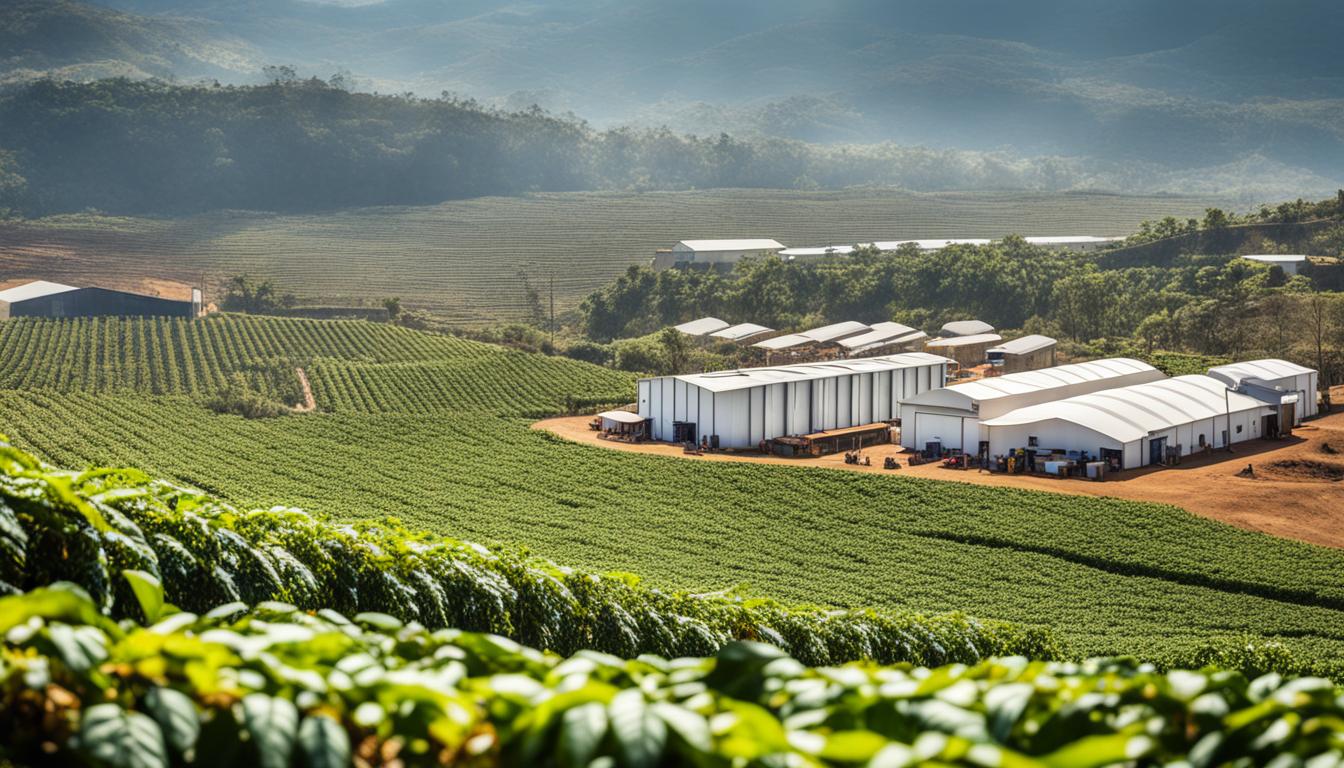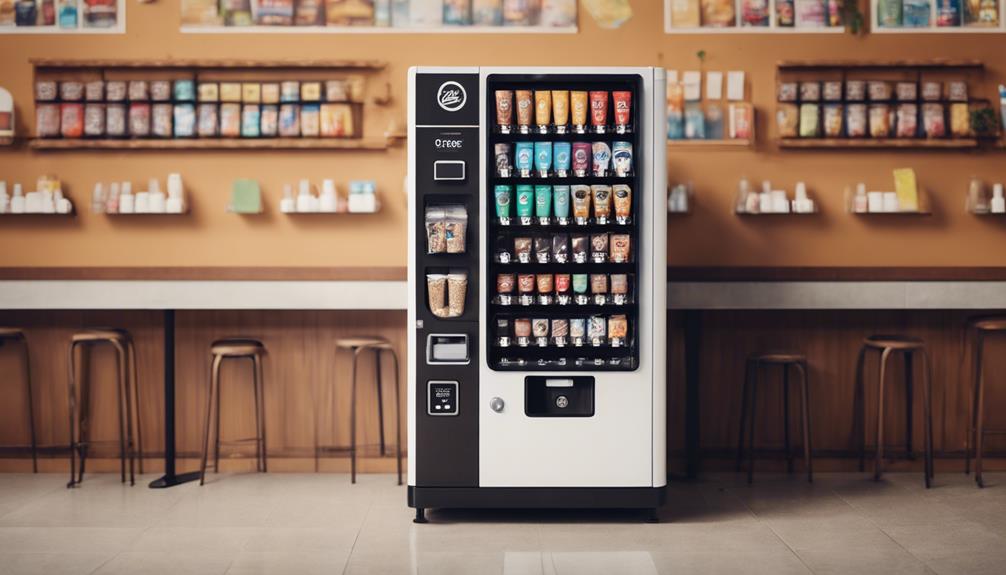What sets Italian coffee apart from others? The secret lies in its deep-rooted history, a fascinating story that originates in Venice during the 16th century. Venice was at the forefront of Europe’s coffee trade, playing a crucial role in making coffee a significant cultural symbol. This influence was immense, with Caffè Florian, the oldest coffee house in the world opened in 1720, becoming a renowned meeting place for famous personalities from around the globe.
Italian coffee culture is renowned for its distinctive, heavily roasted flavor, often enjoyed with a glass of water. This tradition has evolved over centuries, culminating in the creation of the espresso by Angelo Moriondo in the early 20th century and further refined by Achille Gaggia’s innovative pressure extraction method. Today, these historical and cultural advancements are embodied in the renowned Italian espresso, appreciated globally.
Key Takeaways
- Venice was crucial for introducing coffee beans to Europe in the 16th century.
- Caffè Florian, established in 1720, is the world’s oldest coffee house still in operation.
- Italian coffee’s distinct heavily roasted flavor has deep historical roots.
- Angelo Moriondo and Achille Gaggia were pivotal in the development of the espresso.
- The legacy of Italian coffee is a blend of history, culture, and innovation.
The Heritage of Italian Coffee Brands
Italian coffee culture is a tapestry woven with rich history and significant contributions to global coffee traditions. From the bustling cafes to the iconic coffee houses, Italy’s passion for coffee manifests through an enduring legacy.
Historical Influence on Coffee Culture
Italian espresso history is marked by individuals who have left indelible marks on coffee culture. Angelo Moriondo, the inventor of the espresso machine, and Achille Gaggia, who perfected the pressure extraction method, revolutionized coffee brewing. Their innovations not only enhanced the coffee experience but also solidified espresso’s cultural influence worldwide.
The Role of Venice in Coffee Trade
The Venice coffee trade played a pivotal role in the rise of coffee culture in Europe. Being one of the first ports to import coffee beans, Venice became a central hub in the coffee trade. The establishment of Caffè Florian, the oldest coffee house still in operation today, epitomizes the city’s historical significance. It was in these vibrant coffee houses that intellectuals, revolutionaries, and pioneers gathered, forever impacting Italy’s coffee heritage.
Early Beginnings of Italian Coffee
The early Italian coffee culture is renowned for its rich history and profound influence on the global coffee scene. A cornerstone of this heritage is Caffè Florian, the oldest operating coffee house in the world.
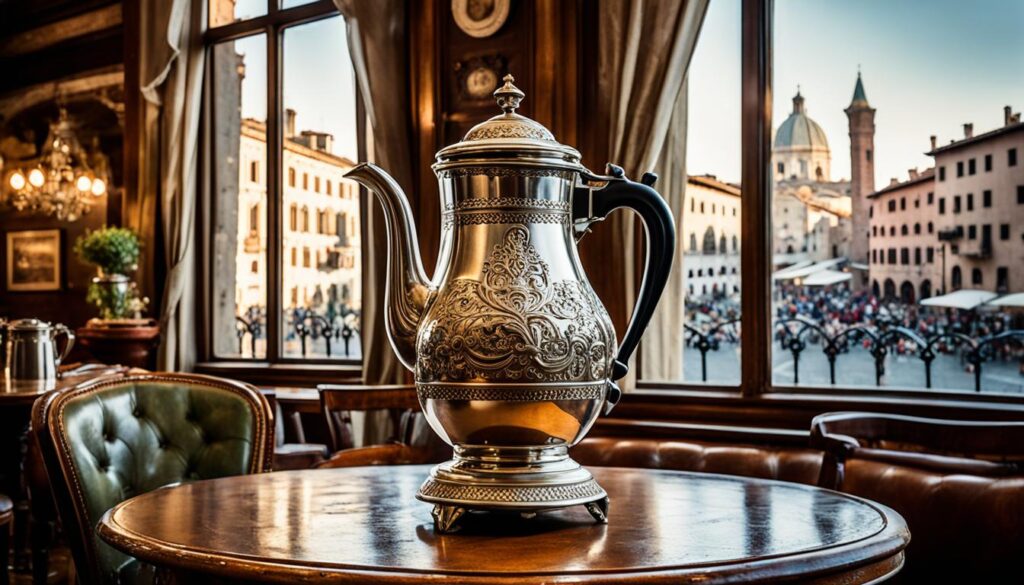
Caffè Florian: The Oldest Coffee House
Established in 1720, Caffè Florian resides in Venice’s Piazza San Marco, offering a historical ambiance alongside its esteemed coffee. It has attracted a diverse clientele over the centuries, including literary figures like Goethe, Lord Byron, and Casanova, who found inspiration within its iconic walls.
Influential Figures in Italian Coffee History
The landscape of early Italian coffee was shaped by influential coffee pioneers, notably Angelo Moriondo and Achille Gaggia. Moriondo’s innovation led to the invention of the first espresso machine, laying the groundwork for modern coffee culture. Following this, Gaggia’s development of the pressure extraction technique introduced the world to a richer, more concentrated espresso topped with crema, cementing the drink’s beloved status.
These visionary contributions were pivotal during a significant period of Italian development, where coffee shops emerged as essential hubs for intellectual and social gatherings.
Where Does The famous coffee Italian brand source their beans
Italian coffee brands are renowned for their meticulously sourced premium beans, emphasizing rich, well-balanced flavor profiles primarily from regions including Brazil, Colombia, and Ethiopia. The coffee bean sourcing process places a strong focus on Arabica varieties, favored for their superior quality and complexity.
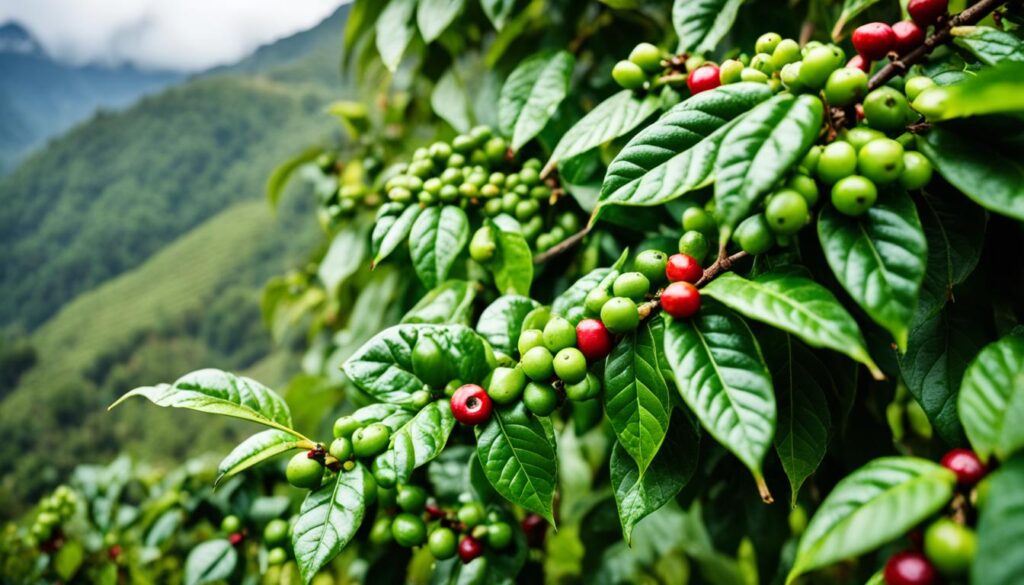
The distinct taste and aroma that characterize Italian brand coffee beans stem from the combined influence of the beans’ diverse origins and traditional roasting techniques honed over generations. These methods help in achieving the quintessential flavor that Italian espresso is famous for worldwide.
- Brazil: Known for beans with a bold, nutty flavor and chocolate undertones.
- Colombia: Valued for its medium-bodied, vibrant acidity, and fruity notes.
- Ethiopia: Prized for its unique, floral, and wine-like flavors.
Moreover, these brands balance their heritage with innovations in coffee production, maintaining a commitment to quality. This blend of honoring traditions and embracing modern techniques ensures the consistent excellence of their espresso bean origins, appealing to coffee aficionados globally.
Popular Italian Coffee Brands
Two giants in the Italian coffee world, Lavazza and Illy coffee, not only epitomize excellence but also boast rich legacies that span over a century. These brands signify the pinnacle of Italian espresso brands, celebrated for their premium quality and global impact.

Lavazza’s Global Dominance
Lavazza’s journey from a humble grocery store in Turin to a globally renowned brand showcases its commitment to quality and sustainability. With signature blends that have become household names, Lavazza continues to dominate the coffee industry, embodying what a top-tier Italian espresso brand should be. Their dedication to sourcing the finest coffee beans and innovating within the market is reflected in their widespread acclaim and consumer loyalty.
Illy: A Symbol of Quality
Founded by Francesco Illy in 1933 in Trieste, Illy coffee represents a unified blend of high-quality Arabica beans, renowned for their smooth and rich flavors. The invention of the pressurized coffee machine under Illy’s name revolutionized the coffee world, setting new standards for espresso. Illy’s steadfast focus on quality and innovation continues to shape the coffee landscape, making it a distinguished name among Italian espresso brands globally.
Lavazza: A Century-Old Legacy
Lavazza’s enduring journey, which began in 1895, blends tradition with innovation, creating a profound coffee brand legacy. This family-owned enterprise has perfected the meticulous art of selecting premium coffee beans, ensuring high-quality produce in every cup.
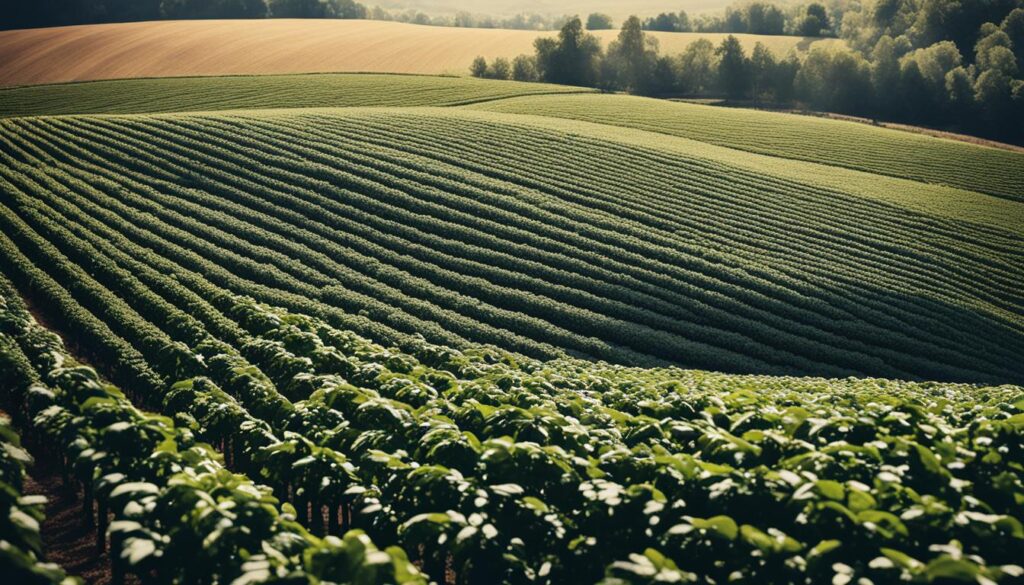
Bean Sourcing and Selection
Renowned for its bean selection, Lavazza meticulously sources its beans from renowned coffee-growing regions across the globe. This careful approach to sourcing ensures the consistency and richness in every Lavazza coffee blend. The brand places immense emphasis on sustainability and ethical practices, guaranteeing a positive impact on coffee-growing communities worldwide.
Lavazza’s Famous Blends
Lavazza has created a variety of celebrated coffee blends, each offering unique flavor profiles. Notable blends include:
- Lavazza Rossa: A rich, full-bodied blend combining sweet Brazilian and African beans.
- Crema e Gusto: A perfect mix of Arabica and Robusta beans, delivering an intense and creamy espresso.
- Qualita Oro: Comprising 100% Arabica beans from Central America and Africa, this blend is renowned for its aromatic notes.
The mastery in creating these blends demonstrates Lavazza’s commitment to maintaining its legacy as a leader in the coffee industry. By continually adapting to modern practices while respecting century-old traditions, Lavazza remains a benchmark for coffee excellence globally.
“Quality is our passion, from the bean to the cup.” – Lavazza
Lavazza’s approach to coffee blends and bean selection has enabled it to maintain a significant global presence, managing numerous brands and manufacturing facilities around the world. This combination of heritage, quality, and innovation solidifies Lavazza’s position as a preeminent coffee brand.
The Unique Touch of Illy
Illy, founded by Francesco Illy, stands as a beacon of quality and innovation in the coffee world. Renowned for the signature Illy coffee experience, the brand leverages its expertise to deliver a product recognized for its superior taste and consistency. The pillars of Illy’s excellence are deeply rooted in their commitment to creating exceptional coffee, the unique blend of premium Arabica beans, and their educational initiatives.
Commitment to Excellence
Illy’s commitment to excellence is reflected in their meticulous approach to coffee production. By selecting only the finest premium Arabica blend from sustainable sources, Illy ensures that every cup delivers a uniformly rich and balanced flavor. This dedication to quality is a testament to their understanding that creating the perfect coffee experience begins with the finest raw ingredients.
Illy’s Singular Blend
A cornerstone of the Illy coffee experience is their singular blend, a harmonious composition of nine distinct Arabica beans sourced from the most prestigious growing regions around the globe. This unique blend captures a spectrum of nuanced flavors, ensuring a consistently superior product that coffee enthusiasts have come to trust and love.
Educational Pursuits with Università del Caffè
Illy extends its influence beyond the cup through the Università del Caffè. This institution is dedicated to spreading knowledge about the art and science of coffee, from cultivation to brewing techniques. The Università del Caffè is instrumental in educating farmers, baristas, and coffee aficionados, promoting sustainable practices and enhancing the global appreciation for the Illy coffee experience.

Segafredo Zanetti: Combining Tradition and Innovation
Segafredo Zanetti, a key segment of Massimo Zanetti Beverage Group, epitomizes a unique blend of tradition and innovation within the coffee industry. As one of the global coffee brands targeting a diverse international audience, Segafredo Zanetti coffee has successfully catered to various consumer preferences, standing out with its wide array of blends such as Espresso Casa and Intermezzo.
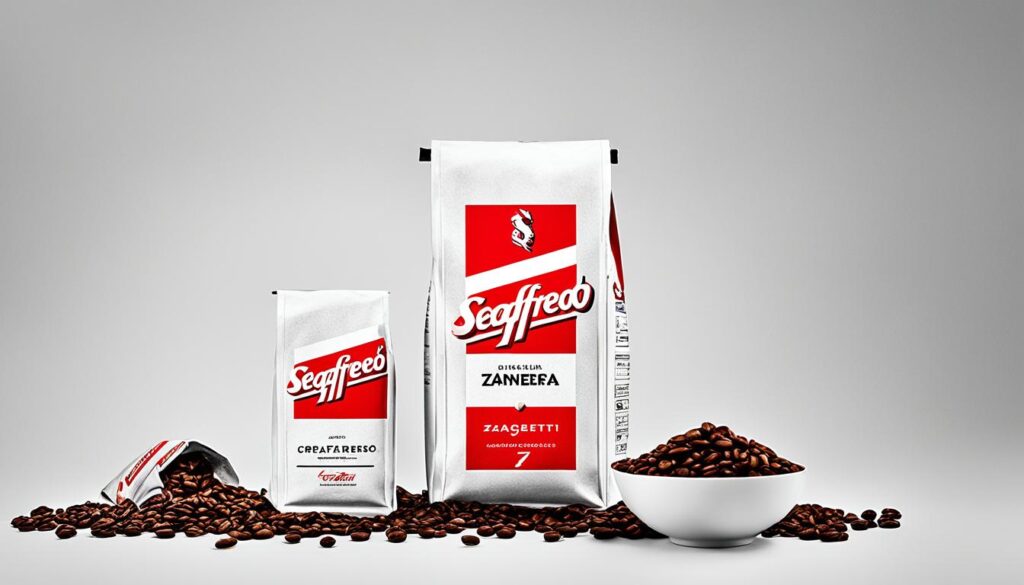
Focusing on coffee industry innovation, Segafredo Zanetti fosters sustainability initiatives that uphold environmental responsibility. One notable project is the Coffee and Climate initiative, which integrates sustainable practices throughout the coffee production process. Their commitment is further evident in the adoption of 100% compostable coffee pod packaging, bridging traditional coffee-making methods with contemporary eco-friendly approaches.
“The future of our coffee lies in the balance between respecting our traditions and adopting new technologies and sustainable practices,” says a spokesperson for Segafredo Zanetti.
Here is a snapshot illustrating Segafredo Zanetti’s blend variety and their contributions to coffee industry innovation:
| Blend Name | Description | Key Features |
|---|---|---|
| Espresso Casa | A rich blend designed to meet the preferences of home espresso drinkers. | Intense Flavor, Balanced Acidity |
| Intermezzo | A versatile blend catering to both espresso and filter coffee lovers. | Robust Aroma, Smooth Finish |
Specialty and Premium Coffee Brands
Emerging prominently from Italy’s extensive coffee brand repertoire, both Caffè Vergnano and Danesi Caffè hold esteemed positions in the specialty Italian coffee landscape. These brands stand as paragons of excellence, intertwining classical roasting methods with modern advancements to deliver superior, premium coffees.
Tradition Meets Innovation
Caffè Vergnano, renowned as the oldest coffee roastery in Italy, blends tradition with innovation seamlessly. Their specialty Italian coffee offerings like the Arabica Blend Pods showcase their meticulous dedication to quality. Vergnano’s storied heritage and relentless pursuit of excellence extend its influence globally, making it a beloved name among connoisseurs.
Signature Blends by Danesi Caffè
Similarly, Danesi Caffè epitomizes Italian coffee craftsmanship with its expansive array of signature blends. Among their celebrated selections, the Gold espresso blend, composed of premium Arabica beans, stands out for its rich, refined flavor. With a focus on sustainability and ethical practices, Danesi Caffè not only delivers exceptional coffee but also contributes positively to the environment.

| Brand | Specialty Products | Key Attributes |
|---|---|---|
| Caffè Vergnano | Arabica Blend Pods | Oldest roastery, innovation in quality, international presence |
| Danesi Caffè | Gold espresso blend | Signature blends, premium Arabica beans, focus on sustainability |
Traditional Regional Italian Coffee
Italy’s rich coffee heritage is deeply rooted in its diverse regions, each offering its unique take on this beloved beverage. From North to South, the rich, aromatic flavors of regional Italian coffees reflect centuries-old traditions and a passionate commitment to excellence.

Neapolitan Brands: Caffè Borbone and Kimbo
In the heart of Naples, Neapolitan coffee brands like Caffè Borbone and Kimbo have solidified their reputation through both tradition and innovation. Caffè Borbone is renowned for its distinctive blends that marry Robusta and Arabica beans, such as the popular Respresso Blue. These blends are celebrated for their full-bodied flavor and robust aroma, making a mark in the regional coffee landscape.
Similarly, Kimbo has become synonymous with high-quality, make-at-home coffee options. Its dedication to sustainability is evident through its alliance with the Rainforest Alliance, ensuring ethical sourcing and production practices. This commitment highlights Kimbo’s role in upholding the rich Neapolitan coffee culture while steering it towards a more sustainable future.
Distinctive Tastes Across Italian Regions
The diverse tastes and aromas of regional Italian coffees are a testament to the country’s varied climates, cultivation practices, and cultural influences. From the intense and rich profiles of Neapolitan brews to the more delicate and nuanced flavors found in other parts of Italy, each region offers a unique coffee experience.
Neapolitan coffee brands like Caffè Borbone and Kimbo exemplify this diversity. Their products serve to heighten the sensory experience of coffee lovers, inviting them to savor not just a drink but a slice of Italian heritage. These brands, anchored in regional identity, showcase the full spectrum of Italian coffee culture—from Naples’ robust offerings to the subtle yet complex flavors from regions like Modena.
Roasting Techniques and Their Importance
Roasting coffee beans is an intricate art, demanding a precision akin to baking. This craft is especially crucial in achieving the robust taste associated with Italian coffee. By employing specific Italian roasting techniques, roastmasters shape the beans’ flavor, color, and texture, creating the beloved medium to dark roasts that characterize Italian brews.
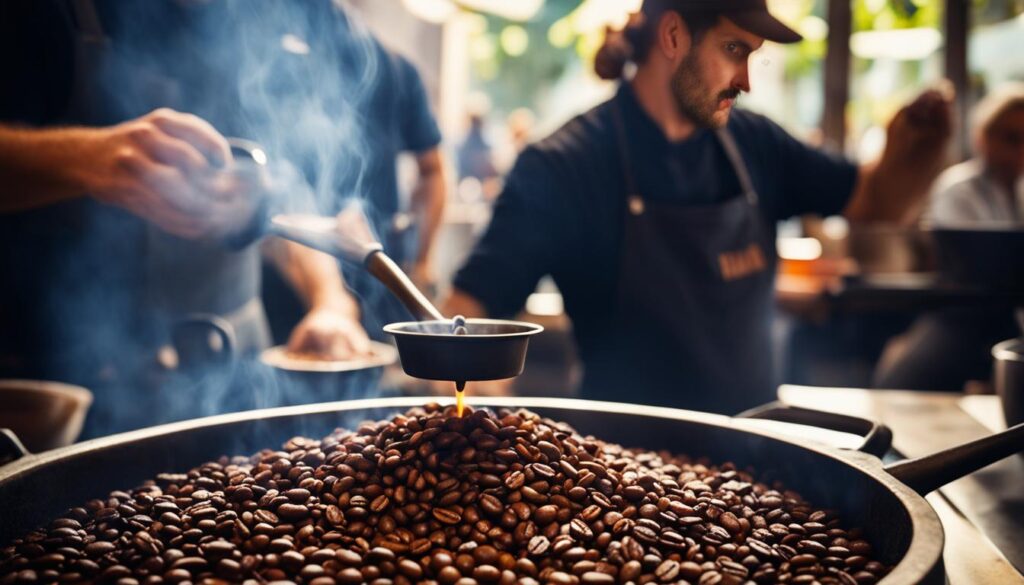
The Art of Medium and Dark Roasting
Italian roasting techniques focus on medium to dark roasts, emphasizing intense flavor and depth. The process involves conducting coffee bean roasting at precise temperatures, carefully monitoring the development of the beans. Roastmasters leverage their skill to enhance the natural oils within the beans, resulting in a rich, full-bodied coffee experience. The unique taste of each blend is achieved through these meticulously controlled roasting routines, essential to the heritage of Italian coffee craftsmanship.
Maintaining Consistency and Quality
Consistency and quality are paramount in producing exemplary Italian coffee. To achieve this, roastmasters utilize advanced technology and keen intuition during coffee bean roasting. Precise temperature control and timing ensure that every batch meets the high standards expected by Italian coffee aficionados. This attention to detail guarantees that each cup delivers the expected boldness and aroma, maintaining the celebrated quality consistency across all Italian coffee brands.
Sustainable Practices in Italian Coffee Brands
Sustainability in the Italian coffee industry has gained significant momentum, with prominent brands like Lavazza and Illy leading the charge towards sustainable coffee production. These companies have ingrained eco-friendly practices into their operational frameworks, ensuring that their ethical coffee sourcing methods meet international sustainability standards.

“Lavazza and Illy exemplify the future of coffee, where quality and environmental consciousness go hand in hand.” Justin – Coffee Industry Expert
Lavazza has implemented various initiatives like the Lavazza Foundation, which supports farmers in adopting environmentally friendly practices. This commitment extends to developing eco-friendly coffee packaging, reducing the environmental footprint at every step of the supply chain.
Similarly, Illy ensures that rigorous standards back its sustainable coffee production. The brand’s adherence to ethical coffee sourcing is reflected in its long-term relationships with coffee growers, promoting sustainability from seed to cup.
- Environmental Responsibility: Both brands prioritize the environment in their cultivation and production processes.
- Compostable Packaging: Developing packaging solutions that minimize waste.
- Global Benchmarks: Aligning with international sustainability standards to safeguard both the environment and community well-being.
This move towards sustainability not only preserves the rich heritage of Italian coffee but also ensures that future generations can enjoy high-quality, eco-friendly coffee. The dedication to ethical coffee sourcing and sustainable practices illustrates the forward-thinking mindset of these iconic brands.
How Italian Coffee Brands Adapted Over Time
The evolution of Italian coffee brands showcases a profound ability to adapt and innovate, especially evident in their brewing methods. From the pioneering espresso machines designed by Angelo Moriondo to the iconic Moka pot introduced by Alfonso Bialetti, Italian coffee has continually progressed. These advancements reflect a dynamic response to both technological improvements and consumer demands.
Innovation in Brewing Methods
Italy’s coffee brewing landscape has been shaped by relentless innovation. The early 20th century saw the birth of espresso machines, evolving through the years to include more refined techniques such as Achille Gaggia’s pressure extraction method. This refinement not only catered to a more flavorful espresso but also embodied the spirit of Italian coffee innovation. The Moka pot, a staple in many households, further illustrates how Italian ingenuity simplified robust coffee brewing at home, maintaining high-quality standards.
Impact of World War II
World War II presented significant challenges, affecting coffee availability and compelling Italians to seek alternatives, including barley-based coffee substitutes. Despite these hardships, the determination to preserve their coffee culture persisted. Post-war recovery saw renewed advancements, with figures like Achille Gaggia enhancing the espresso-making process, thus ensuring the resilience and continued evolution of the Italian espresso industry. This period highlighted the ingenuity and persistence that have come to define Italian coffee brands over the decades.
Such historical resilience and innovative spirit have cemented the Italian coffee industry’s prominent role globally. Adaptable and forward-thinking, Italian coffee brands continue to thrive, influencing global coffee trends and setting benchmarks for coffee excellence.


